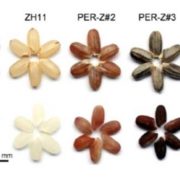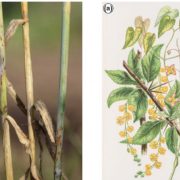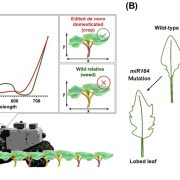Beverley Glover. Flowering plant diversity: development, function and evolution
Filmed at the Gatby Summer School, University of York, 2013
http://www.tree.leeds.ac.uk/tree.2.0/view_lecture.php?permalink=MTA2Nw
 Abstract: The enormous species diversity of the flowering plants has puzzled evolutionary biologists since Darwin’s day. The rapid radiation of the flowering plants can be attributed at least in part to their recruitment of insects as vectors for their pollen, and the subsequent reproductive isolation that arose between populations with different floral morphologies. Understanding the relationships between flowers and their pollinators is important not only in understanding the rapid radiation of the angiosperms, but also in devising strategies to optimise yield of key insect-pollinated food crops such as fruits, legumes and oilseeds. In this talk I will discuss our recent research into how petal morphology influences pollinator behaviour and plant evolution. The petal surface affects the optical properties of the flower, its temperature and the way it feels to foraging insects. I will describe how floral features such as the velvety surface of the petunia petal, the iridescent petals of tulips and the insect-mimicking petal spots of daisies are built, how these features influence pollinator behaviour, and how our work is beginning to define the molecular changes underpinning their evolution.
Abstract: The enormous species diversity of the flowering plants has puzzled evolutionary biologists since Darwin’s day. The rapid radiation of the flowering plants can be attributed at least in part to their recruitment of insects as vectors for their pollen, and the subsequent reproductive isolation that arose between populations with different floral morphologies. Understanding the relationships between flowers and their pollinators is important not only in understanding the rapid radiation of the angiosperms, but also in devising strategies to optimise yield of key insect-pollinated food crops such as fruits, legumes and oilseeds. In this talk I will discuss our recent research into how petal morphology influences pollinator behaviour and plant evolution. The petal surface affects the optical properties of the flower, its temperature and the way it feels to foraging insects. I will describe how floral features such as the velvety surface of the petunia petal, the iridescent petals of tulips and the insect-mimicking petal spots of daisies are built, how these features influence pollinator behaviour, and how our work is beginning to define the molecular changes underpinning their evolution.
Speaker profile: Beverley is currently Reader in Evolution and Development at the University of Cambridge. She studied Plant and Environmental Biology at St Andrews for her first degree, then trained as a plant molecular geneticist, studying developmental problems during a PhD at the John Innes Centre and junior research fellowship in Cambridge. Since establishing her own research group she has focused on the development and function of floral features that enhance pollination success. She is particularly interested in the evolution of developmental programmes controlling key traits. Beverley’s book “Understanding flowers and flowering: an integrated approach” won the British Ecological Society’s Marsh Book of the Year Award in 2009, and she was awarded the Bicentenary Medal of the Linnean Society in 2010. From July 2013 Beverley will take up the Directorship of the Cambridge University Botanic Garden and the associated Professorship of Plant Systematics and Evolution.










Leave a Reply
Want to join the discussion?Feel free to contribute!